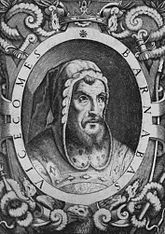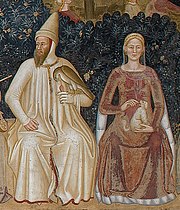| Bernabò Visconti | |
|---|---|

| |
| Lord of Milan | |
| Personal details | |
| Born | 1323 |
| Died | 18 December 1385 |
Bernabò or Barnabò Visconti (1323 – 18 December 1385) was an Italian soldier and statesman, who was Lord of Milan.
Life
He was born in Milan, the son of Stefano Visconti and Valentina Doria. From 1346 to 1349 he lived in exile, until he was called back by his uncle Giovanni Visconti. On 27 September 1350 Bernabò married Beatrice Regina della Scala, daughter of Mastino II, Lord of Verona and Taddea da Carrara, and forged both a political and cultural alliance between the two cities. His intrigues and ambitions kept him at war almost continuously with Pope Urban V, the Florentines, Venice and Savoy. In 1354, at the death of Giovanni, he inherited the power of Milan, together with his brothers Matteo and Galeazzo. Bernabò received the eastern lands (Bergamo, Brescia, Cremona and Crema), that bordered the Veronese territories. Milan itself was to be ruled in turn by the three brothers. The vicious Matteo was murdered in 1355 at the order of his brothers, who divided his inheritance between them.

Equestrian statue of Bernabò Visconti in the Castello Sforzesco, Milan.
In 1356, after having offended the emperor, he pushed back a first attack upon Milan by the imperial vicar Markward von Randeck, imprisoning him. In 1360 he was declared heretic by Innocent VI at Avignon and condemned by Emperor Charles IV. The ensuing conflict ended with a dismaying defeat at San Ruffillo against the imperial troops under Galeotto I Malatesta (29 July 1361). In 1362, after the death of his sister's husband, Ugolino Gonzaga, caused him to attack also Mantua. Warring on several different fronts, in December of that year he sued for peace with the new pope, Urban V, through the mediation of King John II of France. However, having Barnabò neglected to return the papal city of Bologna and to present himself at Avignon, on 4 March 1363 he was excommunicated once more,[1] together with his children, one of whom, Ambrogio, was captured by the Papal commander Gil de Albornoz. With the peace signed on 13 March 1364, Visconti left the occupied Papal lands, in exchange for the raising of the ban upon a payment of 500,000 florins.
In spring 1368 Visconti allied with Cansignorio della Scala of Verona, and attacked Mantua, still ruled by Ugolino Gonzaga. The situation was settled later in the year through an agreement between him and emperor. Two years later he besieged Reggio, which he managed to acquire from Gonzaga in 1371. The following war against the Este of Modena and Ferrara raised again Papal enmity against the Milanese, now on the part of Gregory XI. In 1370, he ordered the construction of the Trezzo Bridge, then the largest single-arch bridge in the world.
In 1373, the pope sent two papal delegates to serve Bernabò and Galeazzo their excommunication papers (consisting of a parchment bearing a leaden seal rolled in a silken cord). Bernabò, infuriated, placed the two papal delegates under arrest and refused their release until they had eaten the parchment, seal, and silken cord which they had served him.[citation needed] He managed to resist, despite also the outbreak of a plague in Milan, whose consequences he suppressed with frantic energy.[2] In 1378 he allied with the Republic of Venice in its War of Chioggia against Genoa. His troops were however defeated in September 1379 in the Val Bisagno.
Bernabò, whose despotism and taxes had enraged the Milanese — he is featured among the exempla of tyrants as victims of Fortune in Chaucer's[3] Monk's Tale as "god of delit and scourge of Lumbardye" — was deposed by his nephew Gian Galeazzo Visconti in 1385. Imprisoned in the castle of Trezzo, he was poisoned in December of that year. The funerary monument of Bernabò Visconti, with an equestrian statue, together with that of his consort, had been made beforehand, in 1363. The sculptures by Bonino da Campione were intended for the church of San Giovanni in Conca. They now stand in the Castello Sforzesco in Milan.
Children

Bernabò and his wife, Beatrice
Bernabò was an ally of Stephen II, Duke of Bavaria: three of his daughters were married with Stephen's descendants. He had 17 legitimate children with his wife:
- Taddea Visconti, Duchess of Bavaria (1351–28 September 1381), married on 13 October 1364 Stephen III, Duke of Bavaria, by whom she had three children including Isabeau of Bavaria, Queen consort of King Charles VI of France
- Viridis Visconti (1352–1414), married Leopold III, Duke of Inner Austria, by whom she had six children.
- Marco Visconti (November 1353 – 1382), married Elisabeth of Bavaria
- Rodolfo Visconti, Lord of Parma (1358–1388)
- Ludovico Visconti (1358–7 March 1404), married Violante Visconti, widow of Lionel of Antwerp. They had a son, Giovanni, who left descendants.
- Carlo Visconti (September 1359–August 1403), married Beatrice of Armagnac, daughter of John II, Count of Armagnac and Jeanne de Périgord, by whom he had four children.
- Valentina Visconti (1360–1393), married firstly in 1378, King Peter II of Cyprus, by whom she had one daughter who died in early infancy; she married secondly, Galeazzo, Count of Virtù
- Caterina Visconti, Duchess of Milan (1361–17 October 1404), married on 2 October 1380 as his second wife, Gian Galeazzo Visconti 1st Duke of Milan, by whom she had two sons, Gian Maria Visconti, 2nd Duke of Milan; and Filippo Maria Visconti, 3rd Duke of Milan, who fathered Bianca Maria Visconti by his mistress Agnese del Maino.
- Agnese Visconti (1362–1391), married in 1380 Francesco I Gonzaga, by whom she had one daughter. Agnes was executed for alleged adultery.
- Antonia Visconti (died 26 March 1405), married Eberhard III, Count of Wurttemberg, by whom she had three sons.
- Mastino Visconti (died 1404), married Antonia della Scala (died 1400), daughter of Cangrande II.
- Maddalena Visconti (1366 – 17 July 1404), married Frederick, Duke of Bavaria, by whom she had five children including Henry XVI of Bavaria
- Aymonette Visconti, married Louis I de Berton des Balbes
- Anglesia Visconti (died 12 October 1439), in January 1400 married King Janus of Cyprus, but the marriage was childless and was dissolved 1407/1409; he married in 1411 as his second wife, Charlotte de Bourbon-La Marche by whom he had six children.
- Giammastino Visconti (1370 – 19 June 1405), married Cleofa della Scala (died 1403), by whom he had three children. She was the daughter of Cangrande II.
- Lucia Visconti (1372 – 14 April 1424), married Edmund Holland, 4th Earl of Kent, the marriage was childless.
- Elisabetta Visconti (1374 – 2 February 1432), married on 26 January 1395 Ernest, Duke of Bavaria, by whom she had five children including Albert III, Duke of Bavaria.
His illegitimate offspring by Donnina del Porri, legitimated in a ceremony after the death of his wife in 1384,[4] were as follows:
- Palamede (d. 1402).
- Lancelloto.
- Sovrana, married Giovanni da Prato.
- Ginevra, married Leonardo Malaspina (d. 1441).
- Enrica, married Franchino Rusca.
In addition, Bernabò had other illegitimate offspring by other mistresses:[5]
—With Beltramola Grassi:
- Ambrogio (1343 – killed in battle Caprino Bergamasco, 17 August 1373), condottiero and Governor of Pavia.
- Isotta (d. 1388), married in 1378 to Count Lutz von Landau, condottiero under the name of Lucio Land (d. 1398).
- Ettore (d. 1413), who briefly took the Lordship of Milan (16 May – 12 June 1412), married Margherita Infrascati.
- Riccarda, married Bernard, Seigneur de La Salle (d. 1391).
—With Montanina de Lazzari:
- Sagramoro (d. 1385), Lord of Brignano, married Achiletta Marliani.
- Donnina (1360–1406), married in 1377 to Sir John Hawkwood.
—With Giovanolla Montebretto:
- Bernarda (d. 1376), married Giovanni Suardi.
- Valentia, married Antonio Gentile Visconti, Lord of Belgioioso.
Bibliography
- Pizzagalli, Daniela (1994). Bernabò Visconti. Milan: Rusconi.
External links
- Biography (Italian)
Footnotes
- ↑ George L. Williams, Papal Genealogy: The Families and Descendants of the Popes, (McFarland and Company Inc., 1998), 34.
- ↑ For his plague regulations for Milan, see Rosemary Horrox, The Black Death(1994) III.65, p 203.
- ↑ Chaucer had been sent to Lombardy in 1378 on behalf of the young King Richard II to seek the support of Bernabò and Sir John Hawkwood on behalf of the English war effort against France. His epistola metrica III.29 was tacitly addressed to Bernabò (Ernest H. Wilkings, The 'Epistolae Metricae' of Petrarch, (Edizioni di Storia e Letteratura), p. 11.
- ↑ " Bernabò Visconti seems to have gone through some sort of marriage ceremony to legitimate his children by Donnina del Porri" (H.S. Ettlinger, "Visibilis et Invisibilis: The Mistress in Italian Renaissance Court Society", Renaissance Quarterly, 1994.
- ↑ Marek, Miroslav. "Complete Genealogy of the House of Visconti". Genealogy.EU. http://genealogy.euweb.cz/italy/visconti2.html#B1.[better source needed]
The original article can be found at Bernabò Visconti and the edit history here.